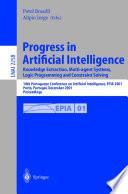10th International Conference, ILP 2000, London, UK, July 24-27, 2000 Proceedings
Shan-HweiNienhuys-Cheng(UniversityofRotterdam,Netherlands) WilliamCohen(WhizbangsLabs,USA) LucDeRaedt(UniversityofFreiburg,Germany) Sa?soD?zeroski(Jo?zefStefanInstitute,Ljubljana) PeterFlach(UniversityofBristol,UK) AlanFrisch(UniversityofYork,UK) KoichiFurukawa(UniversityofKeio,Japan) RoniKhardon(UniversityofEdinburgh,UK) J¨org-UweKietz(SwissLife,Switzerland) NadaLavra?c(Jo?zefStefanInstitute,Slovenia) JohnLloyd(AustralianNationalUniversity,Australia) StanMatwin(UniversityofOttawa,Canada) RaymondMooney(UniversityofTexas,USA) StephenMuggleton(UniversityofYork,UK) DavidPage(UniversityofWisconsin,USA) BernhardPfahringer(UniversityofWaikato,NewZealand) C´elineRouveirol(Universit´edeParis-Sud,France) ClaudeSammut(UniversityofNewSouthWales,Australia) ´ Mich`eleSebag(EcolePolytechnique,France) AshwinSrinivasan(UniversityofOxford,UK) PrasadTadepalli(OregonStateUniversity,USA) StefanWrobel(UniversityofMagdeburg,Germany) AkihiroYamamoto(UniversityofHokkaido,Japan) Additional Referees ´ ErickAlphonse(Universit´edeParis-Sud,France) LiviuBadea(NationalInstituteforResearchandDevelopmentinInformatics, Romania) DamjanDemsar(Jo?zefStefanInstitute,Slovenia) ElisabethGoncalves(Universit´edeParis-Sud,France) MarkoGrobelnik(Jo?zefStefanInstitute,Slovenia) ClaireKennedy(UniversityofBristol,UK) DanielKudenko(UniversityofYork,UK) JohanneMorin(UniversityofOttawa,Canada) TomonobuOzaki(KeioUniversity,Japan) EdwardRoss(UniversityofBristol,UK) LjupcoTodorovski(Jo?zefStefanInstitute,Slovenia) V´eroniqueVentos(Universit´edeParis-Sud,France) VIII ProgramCommitteeandReferees Sponsors of ILP2000 ILPNet2,TheEuropeanNetworkofExcellenceinInductiveLogicProgramming MLNet,TheEuropeanNetworkofExcellenceinMachineLearning CompulogNet,TheEuropeanNetworkofExcellenceinComputationalLogic Table of Contents IInvitedPaper ILP:JustDoIt. . . . . . . . . . . . . . . . . . . . . . . . . . . . . . . . . . . . . . . . . . . . . . . . . . . . 3 DavidPage II Contributed Papers ANewAlgorithmforLearningRangeRestrictedHornExpressions. . . . . . . 21 MartaArias,RoniKhardon ARe?nementOperatorforDescriptionLogics. . . . . . . . . . . . . . . . . . . . . . . . . 40 LiviuBadea,Shan-HweiNienhuys-Cheng ExecutingQueryPacksinILP . . . . . . . . . . . . . . . . . . . . . . . . . . . . . . . . . . . . . . . 60 HendrikBlockeel,LucDehaspe,BartDemoen,GerdaJanssens, JanRamon,HenkVandecasteele ALogicalDatabaseMiningQueryLanguage . . . . . . . . . . . . . . . . . . . . . . . . . . 78 LucDeRaedt Induction of Recursive Theories in the Normal ILP Setting: Issues and Solutions . . . . . . . . . . . . . . . . . . . . . . . . . . . . . . . . . . . . . . . . . . . . . . . . . . . . . . . . . 93 FlorianaEsposito,DonatoMalerba,FrancescaA. Lisi ExtendingK-MeansClusteringtoFirst-OrderRepresentations. . . . . . . . . . . 112 MathiasKirsten,StefanWrobel TheoryCompletionUsingInverseEntailment . . . . . . . . . . . . . . . . . . . . . . . . . . 130 StephenH. Muggleton,ChristopherH. Bryant SolvingSelectionProblemsUsingPreferenceRelationBasedonBayesian Learning. . . . . . . . . . . . . . . . . . . . . . . . . . . . . . . . . . . . . . . . . . . . . . . . . . . . . . . . . . 147 TomofumiNakano,NobuhiroInuzuka ConcurrentExecutionofOptimalHypothesisSearchforInverse Entailment. . . . . . . . . . . . . . . . . . . . . . . . . . . . . . . . . . . . . . . . . . . . . . . . . . . . . . . . 165 HayatoOhwada,HiroyukiNishiyama,FumioMizoguchi UsingILPtoImprovePlanninginHierarchicalReinforcementLearning. . . 174 MarkReid,MalcolmRyan X TableofContents TowardsLearninginCARIN-ALN. . . . . . . . . . . . . . . . . . . . . . . . . . . . . . . . . . . 191 C´elineRouveirol,V´eroniqueVentos InverseEntailmentinNonmonotonicLogicPrograms. . . . . . . . . . . . . . . . . . . 209 ChiakiSakama ANoteonTwoSimpleTransformationsforImprovingtheE?ciencyofan ILPSystem . . . . . . . . . . . . . . . . . . . . . . . . . . . . . . . . . . . . . . . . . . . . . . . . . . . . . . . 225 V´?torSantosCosta,AshwinSrinivasan,RuiCamacho SearchingtheSubsumptionLattic
10th International Conference, ILP 2000, London, UK, July 24-27, 2000
Proceedings James Cussens, Alan Frisch. A New Algorithm for Learning Range
Restricted Horn Expressions⋆ (Extended Abstract) Marta Arias and Roni
Khardon Division of Informatics, University of Edinburgh The King's Buildings,
Edinburgh EH9 3JZ, Scotland {marta ...










